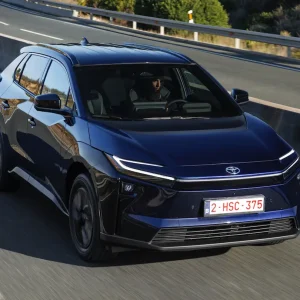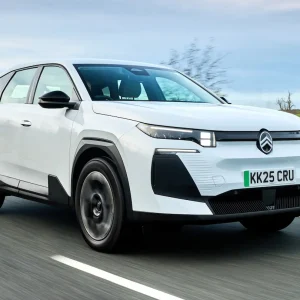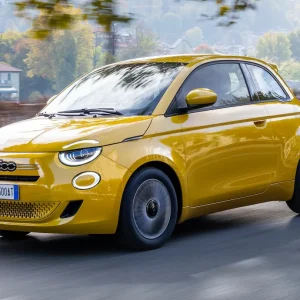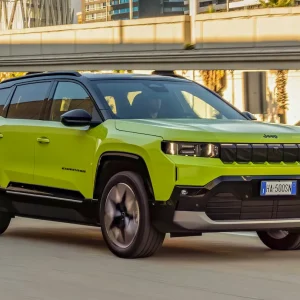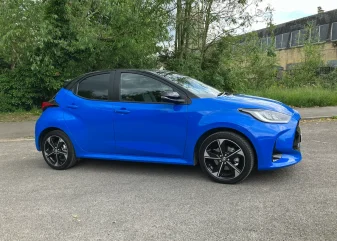
Final Report: Cost benefit?
The arrival of a New Year brings thoughts of renewal, and this applies to the Business Car long-term fleet, since after six months our Toyota Yaris has now departed. At the start of this test you might have expected me to be looking forward to this day, given my reservations about the model having driven it on the launch. So, was it able to win me over?
First, the good stuff. Although my test average of 62.5mpg was a little down on the official WLTP figure, I still consider this to be a success given my relatively motorway-heavy driving habits, for which you wouldn’t expect a small car like the Yaris to be optimised. And as someone with no home charging facility, it’s a strong vote of confidence for conventional hybrid technology, with the Yaris’s economy well ahead of the 40-something mpg I’ve tended to achieve with the rarely-charged plug-in hybrids I’ve run previously.
On the road, the Yaris was a car I generally enjoyed driving from day to day. It was easy to drive around town, and also not overmatched on longer trips, with plenty of power, good refinement, and the welcome presence of adaptive cruise control and an automatic gearbox. I also liked interior technology such as the 12.3in driver display, 10.5in infotainment touchscreen (with well-integrated Apple Carplay) and head-up display.
I was also impressed by the Yaris’s keyless entry system. Too often, in my experience, cars designed to unlock automatically should you open the door with the key in your pocket apply this unreliably, causing frustration as you then have to fish out the key you shouldn’t technically need in order to get access. With the Yaris, however, no such issues – simply reaching for the door handle was enough to gain entry every single time.
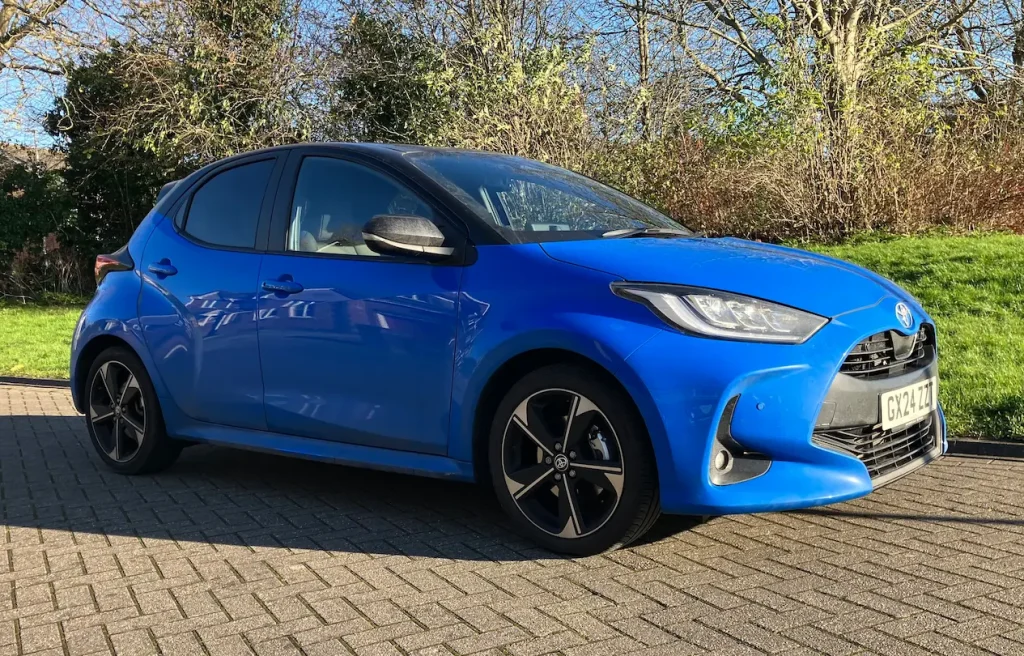
On the more negative side, I will first report a couple of niggles cropped up towards the end of our test. The first was that the rear windscreen washer function stopped working, and the second concerned the Yaris’s bonnet. When this is opened, the bonnet is able to support itself with no need to use the usual stick to prop it open – but one is provided anyway, presumably in case of strong winds or similar, and when I tried to investigate this further it came off in my hand.
More longstanding negatives included the need to turn off audible speed limit change notifications before every single trip, which never stopped being an irritation. There was also, as mentioned in my last report, the disappointing omission of useful cold weather kit such as heated seats.
The biggest problem with our Yaris, however, remains one that was of no matter at all to me during our test, but would be front of mind for fleet managers – the asking price. With range-topping Premiere Edition spec costing nearly £29,000, just being a decent small car isn’t enough – perfection is required, and this isn’t a label that our Yaris proved worthy of carrying. Having run it for six months, I still believe that more modestly-priced versions lower down the range would be a more convincing proposition – and also that, for fleets shopping in this segment, rivals such as the MG3 Hybrid+ and Renault Clio represent better value for money.
| Model | Toyota Yaris Premiere Edition 129bhp |
| P11D price | £28,715 |
| As tested | £28,715 |
| Official consumption | 67.2mpg |
| Our average consumption | 62.5mpg |
| Mileage | 4,913 |
5th Report: Winter of our discontent
One of the advantages of running a test car for several months is the ability to see how it gets on with a range of weather conditions. After all, it’s unlikely you’d reach many conclusions about how a vehicle gets on with an early morning start on a cold day if you only ran it during July. Unfortunately, the changing seasons have highlighted some disappointing aspects of our Yaris’s spec.
I’ve previously written about how, at nearly £29,000, our range-topping Premium Edition Yaris looks very expensive for a small car. Surely, therefore, it must have heated seats as part of an impressive standard equipment list? Sadly not – something I hadn’t quite appreciated until the outside temperature dropped. And of course, with no heated seats you can forget any chance of a heated steering wheel.
I realise that a few years ago, computer chip shortages meant some issues with heated seat procurement, but surely now there can be no such excuse. A quick check around rivals reveals that both the MG3 Hybrid+ and Renault Clio feature both heated seats and a heated steering wheel with their top-spec equipment grades – and both of those models are cheaper to buy than the Yaris.
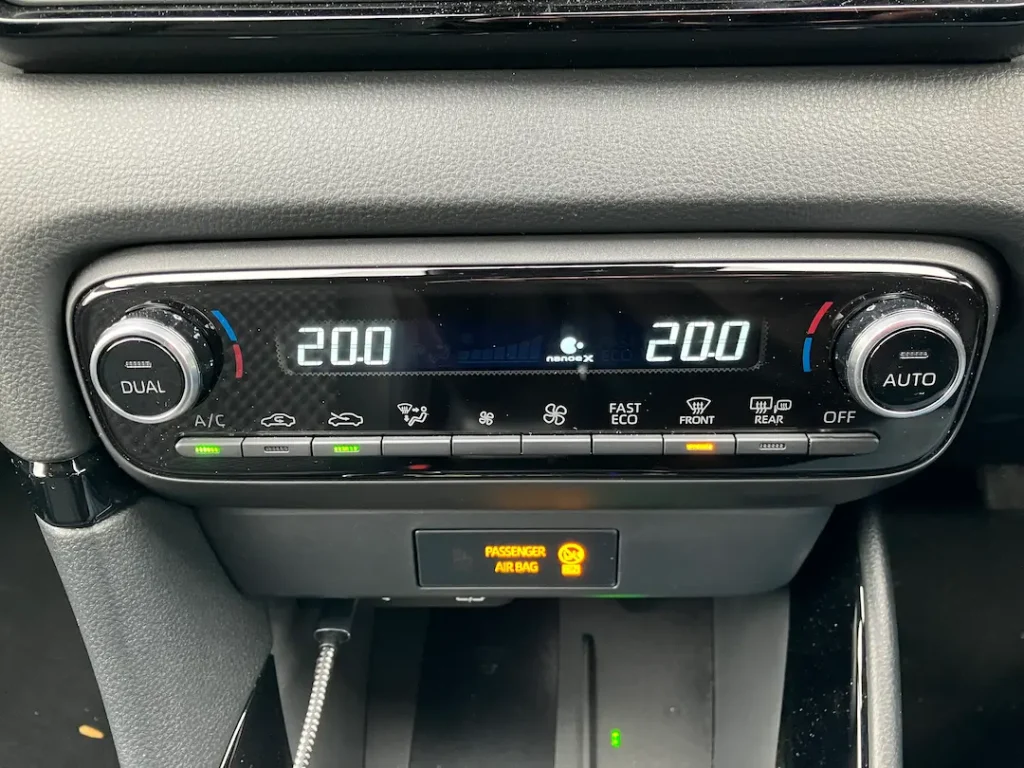
That’s not the end of our Yaris’s cold weather disappointment either. The morning I’m referring to was not especially cold – around 7C – yet it still took several minutes for the windscreen to be demisted, with it seeming to take a very long time for hot air to begin emerging from the vents. I don’t know if this is a quirk of the hybrid powertrain, but from now on, I’m thinking I’ll need to allow a few minutes extra on my morning schedule to ensure the car is ready to go.
As well as colder weather, changing seasons also brought the new Labour Government’s first Budget. There’s been a lot of talk about the effects of this for plug-in hybrid company car drivers, who will see BIK tax rates rise significantly from 2028. But what about the small car market, in which there are no plug-in hybrids? Well, our Yaris, with its conventional hybrid powertrain and 96g/km official CO2 emissions figure, currently incurs a 24% BIK rate, and this is only set to rise to 26% by 2028 – the latter figure only 8% more than plug-in hybrids at that time. The Yaris is better on this front than any pure petrol supermini on the market, and level-pegging with the aforementioned Clio, while being one band lower than the MG3. However, the Yaris’s higher P11D value will still mean drivers’ payments are higher overall. Still – with the exception of pure EVs, which are by far the lowest-rated BIK options on the market – it looks like when it comes to superminis, the Yaris’s conventional hybrid technology will be the most tax-friendly option for the years ahead. Also, it should be noted that drivers opting for a lower-spec option than our Premiere Edition test car, with a slightly less powerful hybrid option, will drop a further BIK band.
| Model | Toyota Yaris Premiere Edition 129bhp |
| P11D price | £28,715 |
| As tested | £28,715 |
| Official consumption | 67.2mpg |
| Our average consumption | 62.4mpg |
| Mileage | 4,346 |
4th Report: Re: Boot
A clear advantage of running a long-term car for several months is it gives us more time to notice subtle details that could be missed on a shorter test drive. And, indeed, more time to notice fairly obvious things, should your correspondent be slow on the uptake.
For instance, I spent a good few weeks with our Yaris being disappointed with the surprisingly small size of the boot, even for a supermini, when compared with the Ford Fiesta ST I own. I’d been planning to write a report highlighting this, and it was only when I looked up the official capacities and realised they were much closer than I’d expected, that I realised the Yaris has an adjustable boot floor. Lower this, and hey presto, it wasn’t ‘surprisingly small’ after all, and day-to-day use got a bit easier.
That being said, with an official capacity of 286 litres, although only four litres off the ST, the Yaris is still a bit down on the biggest luggage spaces on offer with rivals in this segment, and still occasionally feels tight especially for height, with taller items in close proximity to the parcel shelf (which sits 2cm lower than in the ST).

On the subject of not noticing things, I hadn’t realised until recently that with my iPhone connected to the car via Apple Carplay, I had the facility to select particular songs and albums on Apple Music via Siri voice control. For me personally, this is a bit of a game-changer, allowing me to safely programme whatever song may pop into my head while driving down the motorway, for instance. It sometimes takes a couple of goes to pick up what I’m saying, and sometimes repeats the start of a track before it gets going, but I’m not going to hold the Yaris responsible for this given it seems just as likely to be my phone at fault.
One thing I did wonder is, with this sort of functionality available, what is the point in so many manufacturers now developing and deploying their own ‘natural voice control’ technology? The Yaris comes with its own ‘Hey Toyota’ system, which to be honest I never use, since its functions include controlling the car’s own sat-nav – I prefer to use Apple Maps – and adjusting the temperature, which I’m quite happy to do with the knob on the centre console. I have come across these systems in various cars, with varying degrees of effectiveness, but it feels inevitable that at some point they all fail to understand you, and place you in the uniquely annoying position of driving down the road while literally arguing with a machine. Given that pretty much all fleet drivers especially will now have access to Apple Carplay and Android Auto, it begs the question of whether manufacturers’ investment in these systems is especially wise.
| Model | Toyota Yaris Premiere Edition 129bhp |
| P11D price | £28,715 |
| As tested | £28,715 |
| Official consumption | 67.2mpg |
| Our average consumption | 62.4mpg |
| Mileage | 3,949 |
3rd Report: Limiting factor
A couple of months ago, the EU brought in rules mandating the installation of intelligent speed assistance technology on all new cars, requiring them to automatically warn their drivers if they are breaking the speed limit. Although the UK is no longer part of the EU, manufacturing practicalities mean that models sold here are also highly likely to come with the technology – and this includes our Yaris.
Now, I realise it’s hard to complain about a driver being warned if they are breaking the speed limit – particularly from a risk-conscious fleet manager’s point of view. However, I do object to a car making a bonging noise, as the Yaris does, every time the speed limit changes. It’s particularly noticeable if I drive into my local town centre from my house, as this journey sees the limit go from 30mph, to 50mph, to 40mph, and back to 30mph within a few hundred metres.
To get rid of the annoying noises, I have to turn off the road sign assist feature, which with the Yaris includes both these limit change notifications and the speeding warning. This involves using a button on the steering wheel to click into a settings menu on the instrument cluster display, scrolling onto another page of the menu, and selecting the function to turn off the road sign assist.
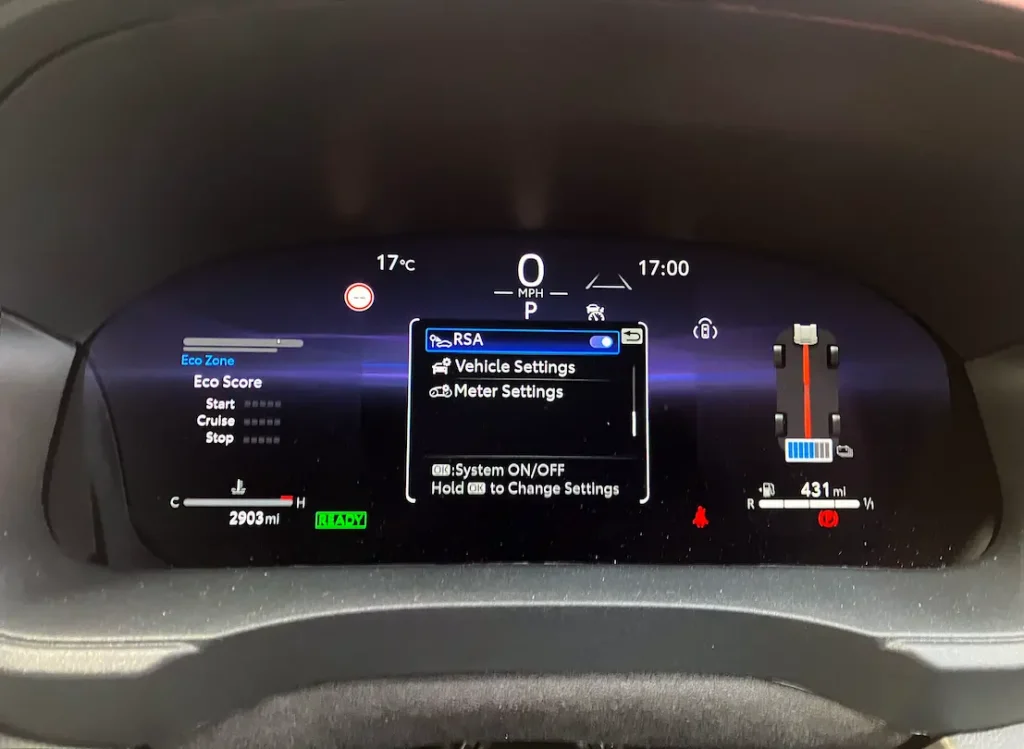
Under the EU regulation, the intelligent speed assistance system has to restart every time the car is switched on, meaning the road sign assist function has to be turned off again each time I use the car, should I not want the annoying limit change noises to also return. And while I realise Toyota’s hands are tied here to a certain extent (although it’s their decision to package the various systems up in this way), I do find it annoying to have to go through the whole procedure again, rather than there being a shortcut button that could bring up my preferred settings, for instance. Also, it is annoying that to remove the bonging sound, I have to turn off the whole system, since I do find having the current limit passively displayed useful from time to time, such as when passing a speed camera – and turning off only the limit-change noise is possible with other cars I’ve tested recently.
Road sign assist is just one of a wide array of ADAS fitted to our Yaris as part of the Toyota Safety Sense package. This also includes the intelligent adaptive cruise control, which I am more appreciative of, finding it particularly useful on long motorway drives. However, I do also have a quibble with the reversing camera (not part of Safety Sense, but as with that package standard throughout the Yaris range). This is because, unlike with some other systems, this features guidelines on the camera view that only point straight back from the vehicle, rather than bending to match steering wheel inputs.
Of course, at less than four metres long the Yaris is hardly the trickiest vehicle in the world to park – but nevertheless, it feels like something where there’s room for improvement.
| Model | Toyota Yaris Premiere Edition 129bhp |
| P11D price | £28,715 |
| As tested | £28,715 |
| Official consumption | 67.2mpg |
| Our average consumption | 63.9mpg |
| Mileage | 2,896 |
2nd Report: Small but assured
Not so long ago, people who reviewed cars would find it difficult to talk about superminis without highlighting a basic limitation – that they were only really designed for short urban journeys, and that while they were technically capable of travelling at motorway speeds, you probably wouldn’t want to attempt a long journey in them, with drivers who regularly covered major distances really needing something bigger. These days, however, the picture is very different, as has been proved during my early time with our long-term Toyota Yaris. Despite the constant growth of modern cars this is still clearly a small vehicle – less than four metres long – and yet I have completed several long motorway journeys in it with no complaints at all. Refinement is good, so you don’t arrive at your destination tired, and the seats are also comfortable when used for long periods.
With 130hp on offer from the hybrid system, there’s plenty of power, and the presence of the electric motor also means a good torquey throttle response. And in addition, the presence of an automatic gearbox and adaptive cruise control system together takes much of the stress out of motorway driving – particularly if stop-start traffic is encountered.
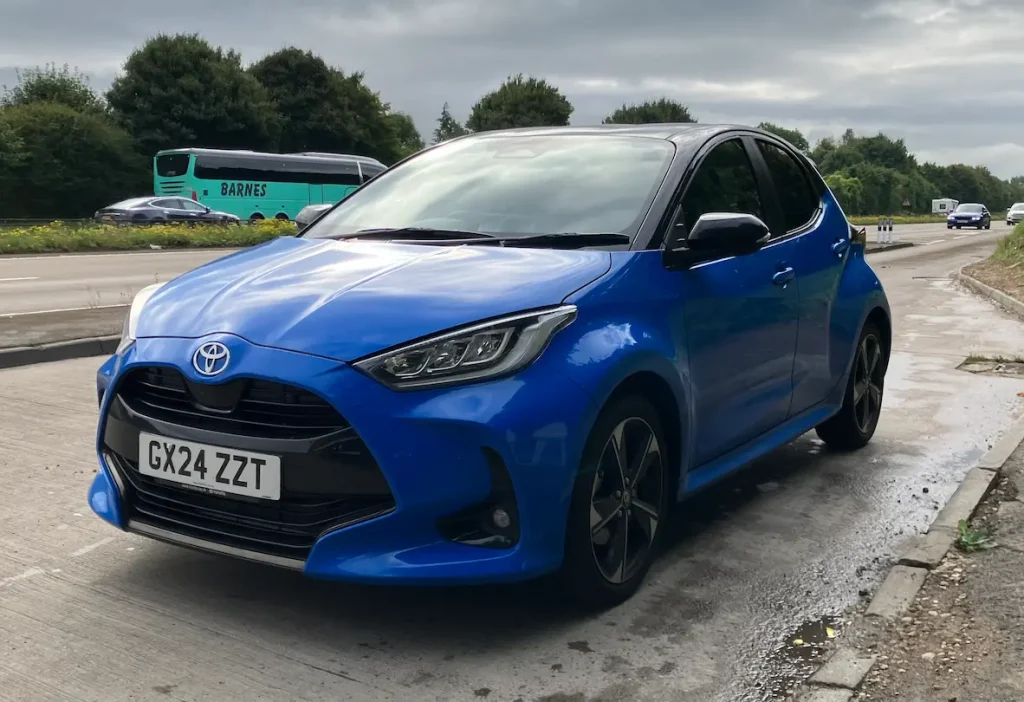
Taking the Yaris out of its urban comfort zone hasn’t proved ruinous for fuel economy either. OK, the 64.2mpg we’ve averaged so far is slightly down on the official WLTP figure, but it’s still impressive given how much of my time with the car so far has been spent at 70mph. In fact, a quick trip through the archive tells me its tracking to be the most economical car I’ve run on the Business Car fleet since I joined the title nearly seven years ago.
There’s also a bigger car feel when it comes to the Yaris’s interior technology. With our Premiere Edition test car, you get a 12.3in driver display, a 10.5in infotainment touchscreen, and also a head-up display, which as well as looking impressive usefully integrates sat-nav instructions (including those provided via Apple Carplay) into the driver’s eyeline. Yet despite all the screens, separate climate controls remain, meaning no distracting trips into the touchscreen are needed to adjust the temperature. In fact, perhaps the only downside of all this big car tech is that it comes with a big car price, since for the near-£29k P11D of our test car, a range of attractive, larger C-segment hatchbacks – or indeed B- and even C-segment SUVs – would be available.
| Model | Toyota Yaris Premiere Edition 129bhp |
| P11D price | £28,715 |
| As tested | £28,715 |
| Official consumption | 67.2mpg |
| Our average consumption | 64.2mpg |
| Mileage | 2,173 |
1st Report: Time for a rematch
There’s always a sense of anticipation when a new car joins our long-term fleet, and this Toyota Yaris is no exception. However, your correspondent’s personal feelings about the coming few months are a little mixed, for reasons we’ll get into shortly.
First, the context. The Yaris has long been established as a strong small car contender, and received a facelift earlier this year. Updates included a new, more powerful 130hp powertrain option, which sits alongside the existing 116hp version in the range, and perhaps more significantly than the horsepower figure, also offers a 30% increase in torque. The Yaris also gained a new infotainment set-up, with a 12.3in driver display and a 10.5in central infotainment touchscreen, as well as updates to its package of safety systems.
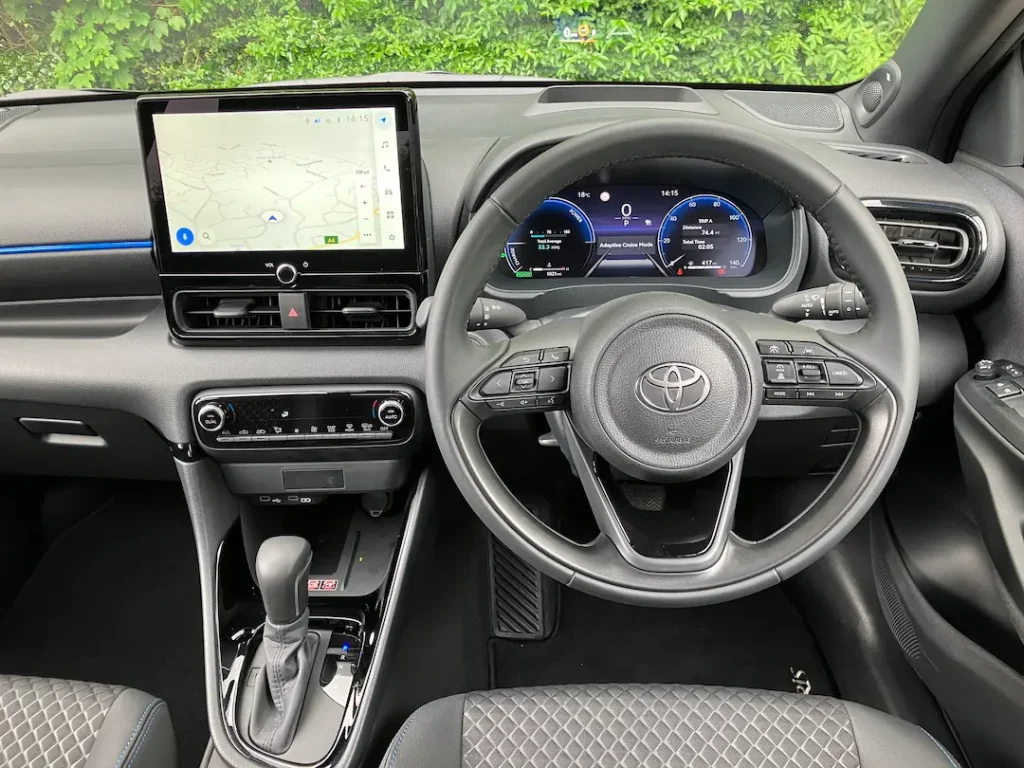
So, why the mixed reaction to this Yaris’s arrival? Well, on the plus side, having spent the past 18 months apologising for very rarely charging various plug-in hybrid long-termers, it’s something of a relief that the Yaris has no plug. Instead, it’s a conventional hybrid – the new and more powerful of the two options listed above, pairing a 91hp petrol engine with a 62kW electric motor. This means that it should be a lot more realistic for my on-test fuel consumption to get close to the official figure – something which has been borne out on some initial drives, with figures over 70mpg having been glimpsed on the trip computer. Toyota has been the car industry’s biggest advocate for conventional hybrids over the past few years, highlighting their benefits to those such as myself without access to home charging, and so far findings are indeed positive – I wouldn’t anticipate being able to achieve such impressive economy with either a conventional petrol or diesel car, or a non-plugged-in PHEV as I ran previously.
As for my reservations about the Yaris, these basically fall into two areas. Firstly, I noted often with my previous long-termer how difficult it seemed to be for people to accept a Vauxhall Astra that cost over £40,000. Well, now we have a proposition that’s probably at least as tough if not more so – a Toyota Yaris that costs nearly £29,000. Admittedly, this is the range-topping Premiere Edition model, which comes with goodies such as an eight-speaker JBL premium audio system, a head-up display, and a smart bi-tone metallic paint finish. But there’s no getting around it, this is an expensive small car.
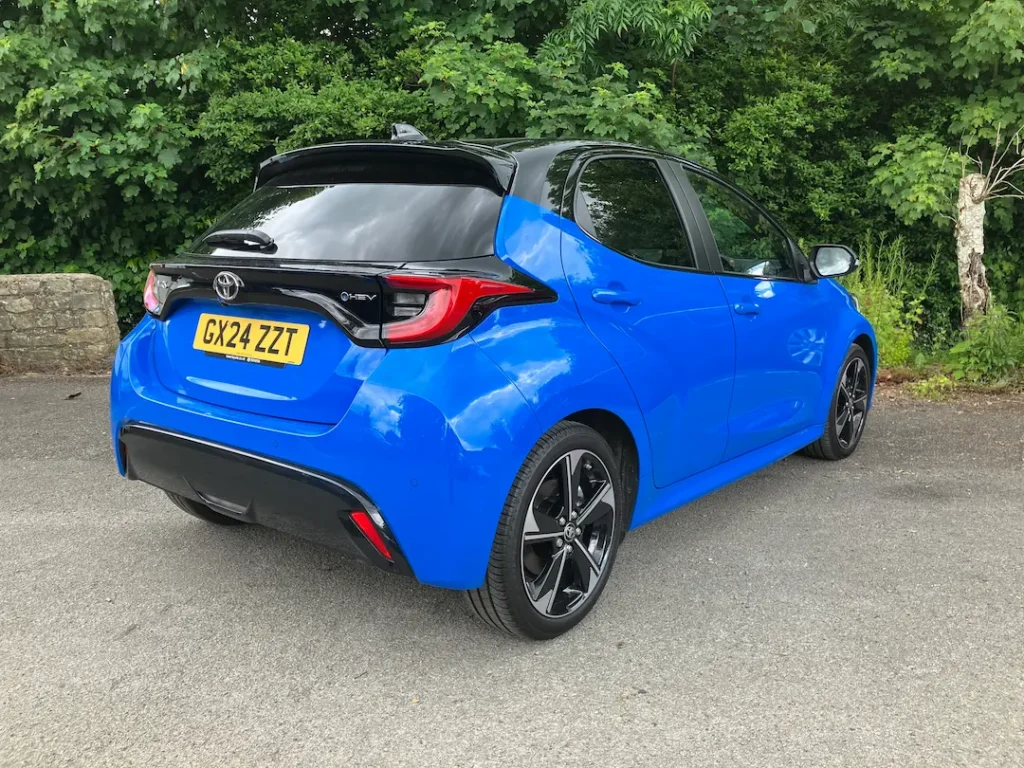
My other cause for concern is that when I reviewed the updated Yaris at its launch a few months ago, there were quite a few niggles. These included an annoying speed limit warning system which was too slow to react when limits changed, and what I considered unsuccessful efforts by Toyota to remove the droning engine note associated with CVT gearboxes, which instead seemed to deliver a loud rumbling engine note when accelerating, like a bad impression of a 1960s muscle car. I also thought the ride was firmer than it should have been for a non-hot hatch, although in fairness I haven’t noticed this so much in my initial drives with our long-termer – the Toyota perhaps benefitting by comparison with the sporty Vauxhall Astra GSE I drove previously. I did also note on that previous test that the Yaris was easy to drive around town, and in some ways, I felt like I enjoyed my time at the wheel more than I was expecting to, without being able to put my finger exactly on why. Of course, this is just the sort of puzzle that my extended time with the Yaris over the next few months should help with solving.
| Model | Toyota Yaris Premiere Edition 129bhp |
| P11D price | £28,715 |
| As tested | £28,715 |
| Official consumption | 67.2mpg |
| Our average consumption | N/A |
| Mileage | 1,357 |
Standard equipment: LED headlights, DRLs, fog lights, rear lights, and indicators, acoustic windscreen, rear privacy glass, rear diffuser, auto-dimming rear view mirror, power adjustable heated and auto retracting door mirrors, leather gear lever and steering wheel trim with red stitching, front sports seats, 12.3in driver display, 10.5in infotainment touchscreen, cloud-based sat-nav, voice control, eight-speaker JBL premium audio system, Toyota Safety Sense package, reversing camera, front and rear parking sensors, intelligent clearance sonar with automatic braking, lane departure assist, blind spot monitor and safe exit assist.

